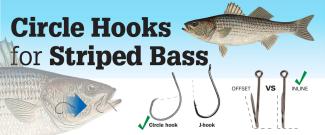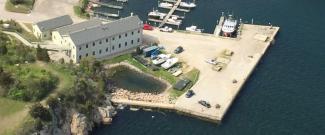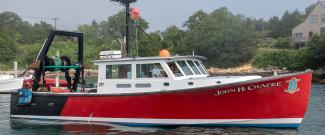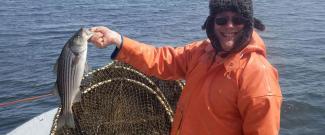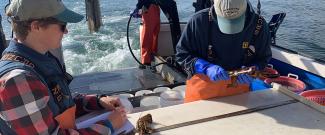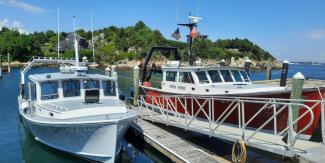Marine Fisheries
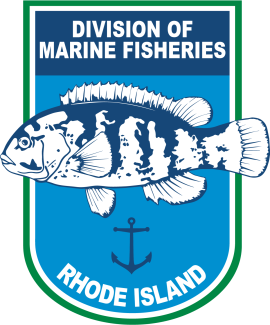
The Division of Marine Fisheries headquarters is located at Ft. Wetherill in Jamestown, RI. The facility was created by refurbishing the existing historic buildings present at the fort. Its location provides easy access to Narragansett Bay and surrounding waters, and boasts a spectacular view. The Marine Fisheries Section also maintains the Coastal Fisheries Laboratory in South Kingstown, RI on Point Judith Pond. The lab is used as a platform for research and monitoring in the coastal ponds, shellfish restoration, aquatic education, and is home of the Access Point Angler Intercept Survey (APAIS) program.
The mission of RI DMF is to manage and enhance Rhode Island’s marine resources and habitats through sound science, informed management decisions, and education. For more information on RI DMF and our mission please see our Strategic Plan
Timely Topics
Commercial bay quahog harvest schedule for the Providence River Shellfish Management Area
- Commercial 2024 harvest schedule: Open only from 8:00 A.M. until 11:00 A.M. on the following dates:
- May 6, 13, 20, 22, and 28.
- June 3, 10, 17, 19, 24, 26, and 28.
- July 1, 2, 8, 10, 15, 17, 22, 24, 29, and 31.
- August 5, 7, 12, 14, 19, 21, 26, 28, and 30.
- September 3, 9, 16, 23, and 30.
- October 7, 14, 21, and 28.
- Fishery closure: The area will close once twenty-one (21) days have been open to harvest for the months from May through October.
- December 16 through December 20, 2024: Open only on the first two (2) non-consecutive weekdays that are not closed due to water quality impairment.
- December 23 through December 27, 2024: Open one (1) weekday on the first available weekday that is not closed due to water quality impairment, not including December 24 and 25 which shall be closed.
- Commercial 2025 harvest schedule*: Open only from 8:00 A.M. until 10:00 A.M. on the following dates:
- February 10 and 24.
- March 10 and 24.
- April 7 and 21.
* Please note the remainder of the 2025 schedule will be addressed in early 2025
- Shellfish Harvester Education
- Oyster Restoration - Quonochontaug Pond
- Party and Charter Reporting Memo
Frequently Asked Questions
If you plan to sell the fish you need a commercial fishing license. To go recreational fishing a saltwater recreational fishing license is required. All fishermen must abide by regulations on legal size, seasons, and/or possession limits.
Recreational License fees and Commercial License fees vary according to use and residency.
R.I. residents can take a resident shellfish limit recreationally without a license. Non-resident property owners and other non-residents must possess a recreational shellfish license.
Yes, however, a recreational license is required. A resident can purchase either a pot license or a diving license for a fee of $40/year.
A "resident" is defined as "an individual who has had his/her actual place of residence and has lived in the State of Rhode Island for a continuous period of not less than size (6) months" [RIGL 20-1-3]
No, only license legal Rhode Island residents can take lobsters.
Oyster season is open from September 15 through May 15, annually.
Scallop season opens at sunrise on the first Saturday in November and closes at sunset on December 31, annually.
Seasonal Closures in Shellfish Management Areas are in effect from sunrise the Saturday just before Memorial Day until sunrise the Tuesday just after Columbus Day, annually.
Rhode Island legal minimum possession size is determined by Total Length of the fish, that is, measured from the tip of the snout to tip of the tail.
Rhode Island legal minimum possession size is determined by carapace length. That is measured from the rear of the eye socket along a line parallel to the center of the body shell to the rear of the body shell.
Beach Seines - Recreational bait nets - Marine species may lawfully be taken for personal use provided that all existing minimum size and possession limit restrictions for the species possessed are adhered to. Also a limit of two quarts per person is allowed for all unregulated marine species. Nets being used cannot exceed four (4) feet in depth and twenty (20) feet in length.

